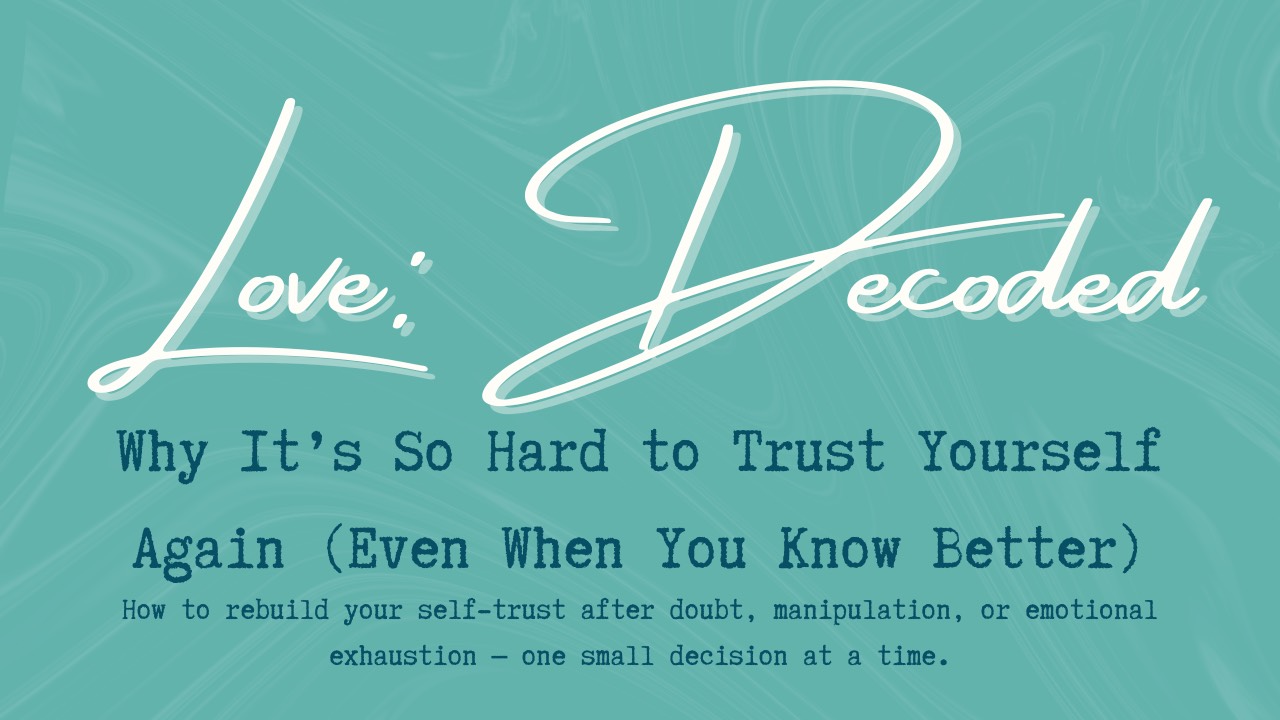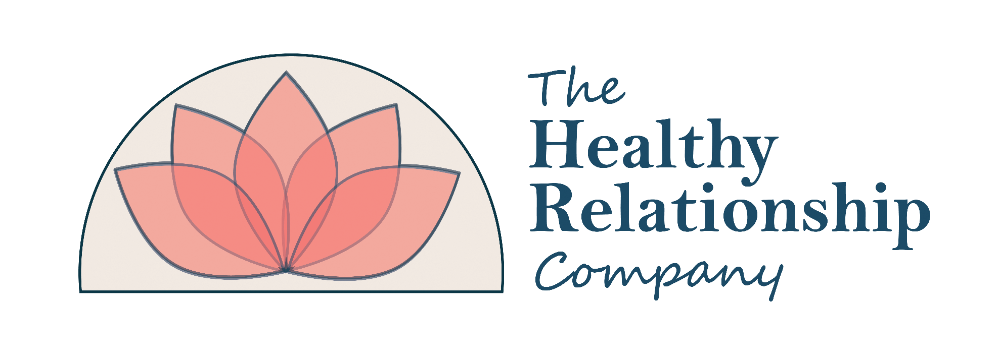
Why It’s So Hard to Trust Yourself Again (Even When You Know Better)
Nov 09, 2025After my last relationship ended, I couldn’t even pick a programme on Netflix without spiralling.
Every decision felt loaded: what if I choose wrong? What if this is another mistake?
It sounds silly, doesn’t it - crying over a remote control. But that moment told me everything I needed to know about where I really was: terrified of trusting myself.
If you’ve ever felt that too, it’s not weakness. It’s what happens when your inner compass has been tampered with for too long.
💬 The Story
Jess left a relationship that slowly made her doubt everything she thought she knew about herself. It wasn’t the kind of abuse anyone could see - no shouting, no bruises. Just the constant erosion of confidence.
Little comments that made her question her memory.
Moments of silence that made her feel like she was always one wrong word away from rejection.
Apologies that started with “I’m sorry, but you’re too sensitive.”
By the time she left, she couldn’t tell the difference between instinct and anxiety.
When she felt uneasy, she wondered if she was overreacting.
When she felt calm, she waited for the other shoe to drop.
Jess wasn’t crazy. Her body had just learned that safety was unpredictable.
🧠 What’s Really Going On When You Don’t Trust Yourself
When you’ve been in a relationship that made you second-guess reality, your brain adapts to survive.
You start outsourcing decisions - not because you want to, but because it feels safer to defer to someone else than risk being “wrong” again.
You apologise quickly, even when you haven’t done anything wrong.
You replay conversations in your head, trying to analyse how you “came across.”
That’s not a character flaw. That’s self-protective conditioning.
Psychologists call it learned self-doubt - a form of cognitive dissonance that occurs when what you feel consistently gets contradicted by what you’re told. Over time, your brain stops trusting its own evidence.
You learned that intuition could get you punished.
You learned that confidence could be twisted against you.
You learned that uncertainty was safer than being certain and dismissed.
So now, even in healthy situations, doubt lingers like a reflex.
🪞 Why “Knowing Better” Doesn’t Always Help
You can read every book, listen to every podcast, and still find yourself second-guessing.
That’s because self-trust isn’t an intellectual skill - it’s an emotional muscle.
And like any muscle, it weakens when it’s been underused or strained.
Think of it like physical therapy. If you break your ankle, you can’t just stand up one day and run. You start small - tiny, careful steps that rebuild strength.
Self-trust works the same way.
You can’t rebuild it through force or logic. You rebuild it through repeated experiences that show your brain:
“See? I made a decision. I survived it. I can do that again.”
🌱 What Rebuilding Self-Trust Actually Looks Like
1. Start with small, low-stakes decisions.
Don’t start with the big life stuff. Start with the tiny things - what to eat, what to wear, when to rest.
Each time you choose without polling five friends, you’re teaching your brain that your own input counts again.
2. Stop narrating every decision as a test.
Not everything has to mean something. You can pick the wrong meal and it’s just lunch - not a moral failure.
Perfection isn’t confidence. Permission is.
3. Pay attention to how “truth” feels in your body.
Your body often knows before your brain catches up.
Truth feels like a quiet exhale.
Doubt feels like noise.
Start noticing the difference - without judging it.
4. Let yourself be wrong without punishment.
When you make a choice that doesn’t go perfectly, resist the urge to spiral.
Being wrong doesn’t mean you can’t trust yourself - it means you’re human.
Each time you respond with compassion instead of criticism, you’re rewriting the internal script.
5. Spend time around people who don’t make you explain yourself.
Healthy relationships reinforce trust by reflecting back safety.
The more you experience being accepted as you are, the less you’ll need to over-analyse your every move.
🧩 The Psychological Bit
When you’ve lived with chronic invalidation or manipulation, your brain adapts to protect you from further harm.
You start using hypervigilance (overanalysing, predicting, scanning for risk) to stay safe.
That hypervigilance becomes habitual, even when danger isn’t present.
So the real work of healing isn’t “stop overthinking.”
It’s teaching your nervous system that it’s safe enough to not overthink.
That’s why people often mistake healing for “becoming confident overnight” - when really, it’s the gradual unlearning of survival habits that once kept you safe.
This is the essence of relational recovery: your body catching up to your brain’s realisation that you’re no longer in danger.
💫 The Turning Point
The first time Jess started trusting herself again, it wasn’t dramatic.
She was walking home from work, phone buzzing with a message from someone new.
Her stomach tightened. The old voice screamed, “don’t say the wrong thing.”
But instead of ignoring it or rationalising it away, she paused and thought, What do I actually want to say?
And she replied honestly - not perfectly, just truthfully.
No second-guessing. No over-editing. Just… her.
That night she slept better than she had in months.
Because that’s how trust returns: quietly.
🌤 The Transformation
Rebuilding self-trust isn’t about becoming fearless. It’s about becoming familiar with yourself again.
It’s remembering that your feelings are valid data, not dangerous information.
That your instincts aren’t the enemy - they’re the map.
And that the part of you that learned to doubt herself wasn’t broken; she was protecting you the only way she knew how.
Now, you get to show her something new:
Safety doesn’t come from control.
It comes from self-trust.
💌 Your Next Step
If you’re trying to find your footing again after doubt, manipulation, or self-blame, start by tracking what your body’s telling you.
The Mirror Tracker is designed to help you notice the patterns, sensations, and emotions that build - or block — your self-trust over time.
Tiny choices. Repeated often. That’s how you come home to yourself.
Stay in the loop!
Get psychology-backed relationship tips straight to your inbox.
We hate spam. We will never sell your information, for any reason. By subscribing to The Clarity Drop Newsletter, you also agree to receive occasional updates and marketing. We will only send things that would be genuinely useful to you. Unsubscribe at any time.
